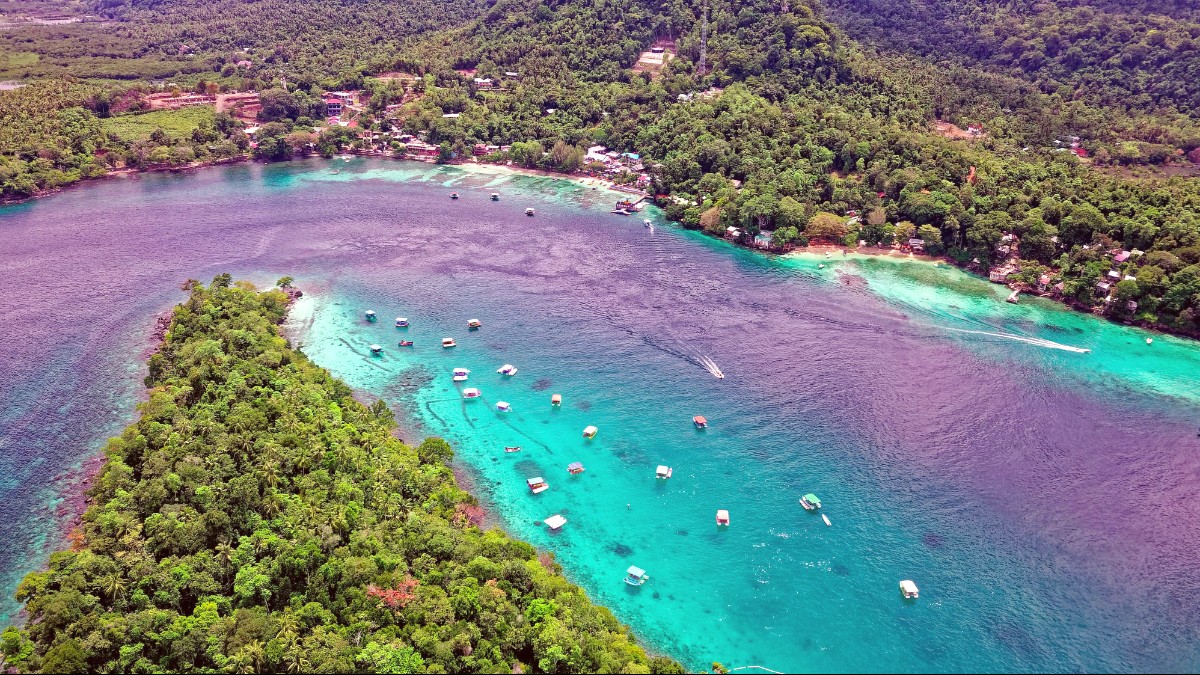
Indonesia
Aceh sits at the very northwestern tip of Sumatra, a strategic location at the crossroads of ancient maritime trade routes. This position, facing the Andaman Sea and the Indian Ocean, historically made it a powerful trading hub, attracting merchants and scholars from across Asia and the Middle East. The Barisan Mountains run through parts of Aceh, creating cooler highland areas like the Gayo Highlands, renowned for their coffee plantations.
Aceh is a storied past, deeply intertwined with the spread of Islam in Southeast Asia. Historically known as "Serambi Mekkah" or the "Veranda of Mecca," Aceh became one of the first places in the region to embrace Islam, serving as a gateway for the faith's expansion across the archipelago.
The Sultanate of Aceh, at its zenith from the 16th to 17th centuries, emerged as a formidable maritime power. It controlled trade routes, possessed a strong military, and developed a rich Islamic intellectual tradition, drawing scholars from far and wide. This period saw the construction of magnificent mosques and the flourishing of religious scholarship, establishing Aceh as a center of Islamic learning and culture. The province maintained a fierce independence throughout centuries, famously resisting Dutch colonial rule for decades in a prolonged and brutal war. This history of resistance instilled a strong sense of pride and self-reliance in the Acehnese people, characteristics that remain evident today. More recently, Aceh gained global attention following the devastating 2004 Indian Ocean tsunami. This natural disaster caused immense loss of life and widespread destruction, yet the subsequent recovery effort showcased the remarkable resilience and unity of its people. The peace agreement signed in 2005, which ended decades of conflict, marks a new chapter in Aceh's history, paving the way for development and increased openness.
Aceh today presents a captivating snapshot for travelers. It features a blend of profound cultural experiences, stunning natural beauty, and a tangible sense of a community that has overcome adversity. The province's adherence to Sharia law creates a distinctive cultural landscape within Indonesia, influencing daily life, dress, and social interactions, which visitors find respectful and interesting.
From the majestic Baiturrahman Grand Mosque in Banda Aceh, a symbol of resilience, to the poignant tsunami memorials, history lives and breathes in its urban centers. Beyond the city, the natural wonders captivate. The island's relaxed atmosphere provides a refreshing contrast to the bustling city. Inland, the Gayo Highlands beckon with their cool climate and renowned coffee plantations, inviting visitors to savor exceptional local brews. Culinary enthusiasts will discover a rich and spicy cuisine, distinct from other Indonesian flavors, found in bustling markets and simple local eateries. Aceh welcomes visitors with genuine hospitality, offering an opportunity to connect with an unique culture, explore beautiful landscapes, and witness the spirit of its people. A journey here engages both mind and senses.
Influenced by Sharia law, offering unique cultural interactions.
Baiturrahman Grand Mosque, tsunami memorials, and more.
From clear coastal waters to cool highland plantations.
Rich, spicy cuisine distinct from other Indonesian flavors.
A community that rebuilt after the 2004 tsunami.
Aceh's local markets buzz with activity and offer a fantastic way to engage with daily life. Try local fruits like durian (if in season) or rambutan. Engage with local coffee farmers in the Gayo Highlands; their passion for coffee is evident in every cup. A visit to a traditional Acehnese coffee shop (warkop) offers a glimpse into social customs, with men often gathering for lively discussions over coffee. Women frequent separate establishments or enjoy coffee at home. This social fabric adds depth to the travel experience.
Dress modestly in public. Remove shoes when entering mosques or private homes. Use your right hand when shaking hands or passing items, as the left hand is considered unclean in Islamic culture. A respectful demeanor goes a long way in fostering positive interactions with locals.
Always ask permission before photographing individuals, especially women. Be mindful when taking pictures in religious sites. Some tsunami memorials or sensitive areas may request discretion or prohibit photography. Respect these guidelines to avoid offense.
Prepare for a journey that engages both mind and senses, discovering a corner of Indonesia with a character all its own.
Beyond the well-known sites, Aceh offers unique local experiences that immerse you into its heritage and natural beauty. These activities connect you with the heart of Acehnese life.
Engage in a traditional cooking class to learn the secrets of Acehnese cuisine, known for its rich spices and distinctive flavors. Participate in a local batik workshop, creating your own traditional fabric designs. For nature lovers, explore the less-visited waterfalls or remote beaches along the coast. Volunteer with local community initiatives for a truly impactful visit. These experiences bring a connection to the destination.
Visit coffee plantations in the Gayo Highlands. Witness the bean-to-cup process and sample world-renowned Acehnese coffee.
Explore underwater ecosystems around Pulau Weh. Discover diverse marine life and pristine coral reefs.
Visit the iconic Baiturrahman Grand Mosque in Banda Aceh. Admire its architecture and historical significance.
Acehnese food is distinctively rich and spicy, with influences from Indian, Middle Eastern, and Malay culinary traditions. Do not miss these local favorites.
Hand-drawn or stamped fabrics featuring traditional Acehnese motifs and colors. Each piece tells a story through its patterns.
Premium Arabica coffee beans from the Gayo Highlands. A perfect gift for coffee aficionados, known for its rich aroma and distinct flavor.
Intricate silver and gold jewelry, often featuring traditional designs and gemstones. These items reflect the region's historical artistry.
Banda Aceh's main traditional market. Find textiles, spices, fresh produce, and local snacks. Engage in polite bargaining.
A place for unique souvenirs related to Acehnese resilience and the tsunami, often including local crafts and books.
Discover smaller, independent shops in Banda Aceh or on Pulau Weh. They often feature handmade jewelry, artwork, and unique textiles.